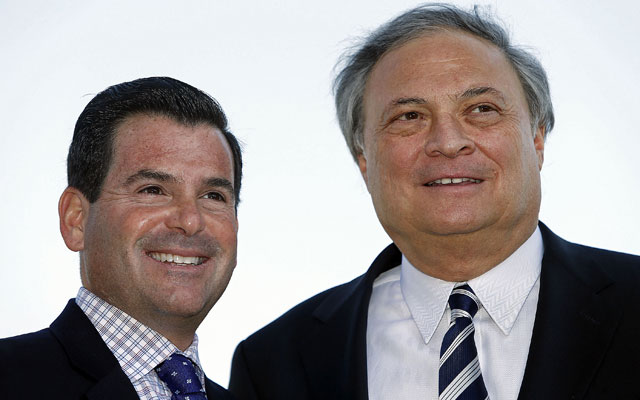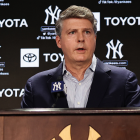MIAMI -- Dan Jennings happily sat at the podium between Marlins presidents Michael Hill and David Samson to announce one of the most interesting, out-of-the-box managerial moves in MLB history: his own move from general manager to the dugout, where he said he will wear uniform No. 26 to symbolize the 26th man. The gregarious Jennings, just the kind of fellow who seems pleased in any setting, seemed especially so on this day.
But first a few words of warning: Don't get too comfortable.
Jennings' bosses, while touting Jennings' obvious energy and possible leadership skills, didn't rule out a switch back to GM at year's end for Jennings, you know, if things don't work out. And lately, they seem to have a way of not working out around here.
Jennings, with his Southern charm in full bloom, enthusiastically invited all the skeptics and critics to come out, and at this point that list very likely includes everyone besides Samson, Hill and club owner Jeffrey Loria, who's famous for quick switches and was notable in his absence following his latest switcheroo.
They've all been doozies in their own way -- but this one invites special ridicule. While the players seem to like Jennings more than your average GM, there seems to be a genuine concern in the clubhouse that this could start to look like a circus sideshow.
This time the Marlins go from Mike Redmond, who had been only an A-ball manager (and former Marlins catcher) to Jennings, who has never managed anywhere (and only coached in high school decades ago). Jennings never got off the bench in his only pro game as a player before being cut by the Yankees' minor-league team.
Jennings is a bright and delightful man. Others may call him a sitting duck.
This change makes it six managers in six years for the Fish, a sort of consistency of instability that might make even George Steinbrenner blush. So, obviously, Redmond's solid two-and-a-half years look like retirement watch territory compared to some of the other short-timers.
As one ex-Marlins person remarked about the stunning change, before Jennings' name surfaced in this space here late Sunday night: "I would send a message of caution to whoever gets the job."
Jennings, a 13-year front office veteran of Marlins wackiness, must understand that he needs to get out of the gate quickly. A 16-22 record, for instance, won't do. That is the very mark at the time of the firing of Redmond, and also of the ill-fated Jeff Torborg 12 years earlier. That first time, Loria shocked the world when he tapped venerable 72-year-old Jack McKeon after a breakfast meeting at the famed Wolfie Cohen's Rascal House restaurant up on Collins Avenue in Sunny Isles Beach.

McKeon was and still is a brilliant baseball lifer, and Loria overlooked the fact McKeon kept calling him "Jerry" to make the most glorious decision of his tenure as Marlins owner. McKeon took that young and underachieving team that had Josh Beckett, Miguel Cabrera and other shining stars to a World Series title. And though it's been mostly downhill from there, Loria can't seem to get that great change out of his mind. So he keeps making them, change after change.
Some of them have worked to a degree (Fredi Gonzalez was good for three-plus seasons, Joe Girardi for one), many have not. But in that time, Loria's Marlins have built quite the reputation for a quick trigger.
Into that fire comes Jennings, a charismatic Crimson Tide guy whose only previous coaching experience came at William Pickett Davidson High in Mobile, Ala., nearly 30 years ago. He may be in a bit better stead than the others because he could always fall back into the front office. Yet, the potential for disaster along the way has to be considered very real.
Redmond and bench coach Rob Leary are gone (Jennings wanted the experienced Mike Goff, a fellow Alabaman, in that role), and word is pitching coach Chuck Hernandez could be moving under the microscope soon, with club big shots believing that both the bullpen and rotation are underperforming. Hernandez is buddies with Jennings from their days together with the Tampa Devil Rays, but only results count here now. And sometimes even that might be enough.
Marlins higher-ups have somehow convinced themselves they have a playoff-worthy team, apparently even without recovering superstar pitcher Jose Fernandez until July or for the most part No. 2 man Henderson Alvarez, who just came back. The team on the field should be excellent (though Christian Yelich and Michael Morse haven't been themselves yet). To many around the league, they look short on the pitching staff, especially compared to the Mets, expected to be their main competitor for second place and in wild-card action in the NL East.
Meantime, they are somehow 0-6 against the retooling Braves, and that's just at home. The problems, as they see them, include underperformance and atmosphere.
"There hasn't been that air of confidence or swagger surrounding (the team)," Hill said.
All the Marlins higher-ups started to feel they needed a change around the time the team hit 3-11 (they weren’t fooled by the 9-1 run that followed, Samson said). Names as candidates, both from the inside and outside, were discussed, until someone suggested Jennings. Samson said the idea came organically.
"Sometimes, it just hits you," Samson said.
So they quickly agreed on that one conference call between the four biggest of the bigwigs -- all except for Jennings, that is, who understandably had to give it some thought. It was never a burning desire of his to manage, but despite the obvious issues, it wasn't long before he joined the others in agreement.
If instability is this organization's hallmark, secret-keeping is another well-known characteristic. Word didn't leak until very late Sunday night, but not before all sorts of names surfaced as possibilities -- from Jeff Conine to Bo Porter to Dusty Baker to Bobby Valentine to current third-base coach Brett Butler, who was said not to have been close to Redmond. (Butler is known for his passion, but, boy, that one would not have been a popular choice in the clubhouse).
Anyway, in a word, Marlins higher-ups see the 38-game performance as flat. That's why they are turning to Jennings, who left the press conference to work on the first speech he'll ever give to a group of adults as their manager/coach. Knowing him, it was probably a doozy, too.
No knock on Redmond, who is a very good manager and should get a job in fairly short order. He's already received calls as he flew back home to Redmond, Wash., which coincidentally is on the other end of the continent.
But few can put words together like the man they call DJ, whom Hill referred to as "a motivator" and "a leader of men." The potential is there for the gregarious Southerner with old-world charm, but at this point that's wholly theoretical.
Marlins execs today positioned Redmond, who helped the team out of the doldrums of the short-lived of Ozzie Guillen era as a "turnaround specialist," but suggested Jennings may be a better long-term fit for the team he helped put together as its GM over the last year and a half. Others will simply view him as the next victim in a lengthening line of them. Jennings, characteristically, didn't run from such a theory.
"Even my own mother, who I love, asked, 'Are you crazy?'" Jennings said.
Jennings, we'll assume for the moment, has his sanity, and can return to the front office he's worked in since 2002 if experience trumps energy and he fails to spark a team he, Hill, Samson and Jennings all seem to agree should be playoff bound. It's really Jennings' bosses who are coming under fire today, for hiring a suit like themselves (Jennings actually favors stylish Robert Graham shirts and Ferragamo shoes; he's quite a spiffy dresser for an Alabaman male), and for making him one of the only managers never to play professionally at any level. Two of the others were John Boles, who coincidentally was once a Marlins manager, and Ted Turner, who was a farcical manager for a game with the Braves before the commissioner put a stop to that.
Samson allowed that he understood if folks see them as less than stable, particularly when it comes to managers. But it is clear at this point that a perception of stability isn't their goal. The real criticism that hurts, he acknowledged, is that they haven't made the playoffs since they all pulled off that McKeon miracle 12 years ago.
If their fans are enjoying the sun and the heat while sipping drinks at the Clevelander beneath the left field pavilion, Loria isn't like that. A New Yorker, he learned his baseball watching, and admiring, the Steinbrenner Yankees, only emboldened from the early and lucky stroke of that magical 2003 season, when the Marlins beat the Steinbrenner Yankees in the World Series. Steinbrenner, you'll recall , did employ Gene Michael as a manager, then later as a GM, so perhaps Loria learned that trick there, too.
The Yalie Loria, an art dealer by trade, is described as a "right-brained thinker," by one confidant, an artistic man who is anything but deliberate and gets confused when working on a project. Once his mind gets going one way, that is it, and that apparently happened at 3-11.
Jennings, meanwhile, is a relentlessly joyful man who may be severely tested here. He named his underwhelming managing/coaching experience as the possible "obstacle." But as any Marlins watcher everywhere understands, there are a lot of potential pratfalls inside that beautifully modern Marlins Park. The biggest one sits in the owners box.





















